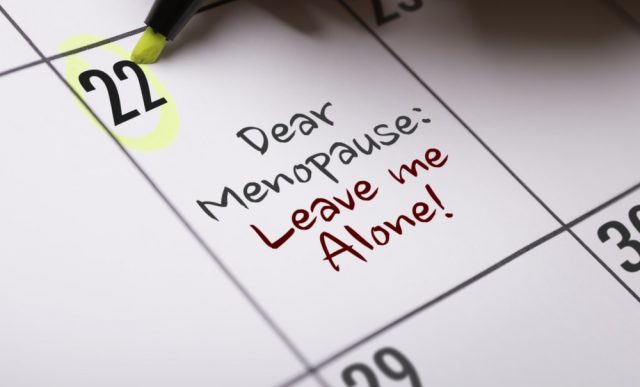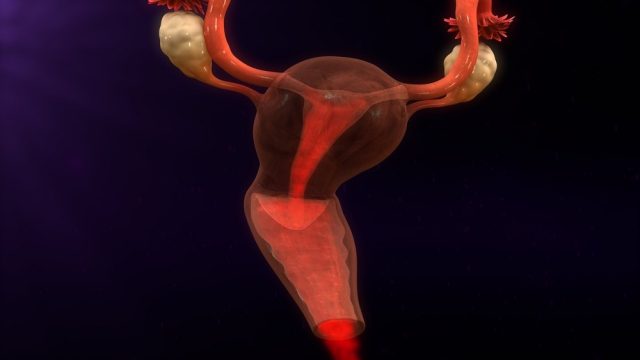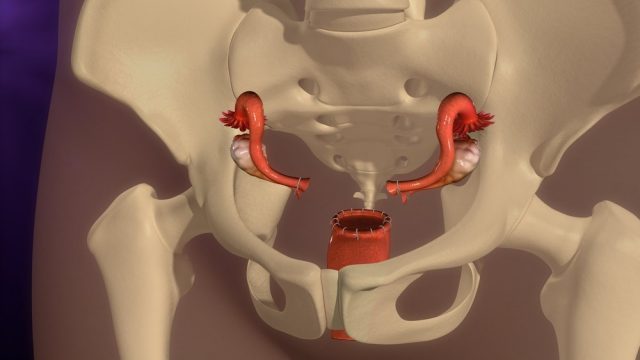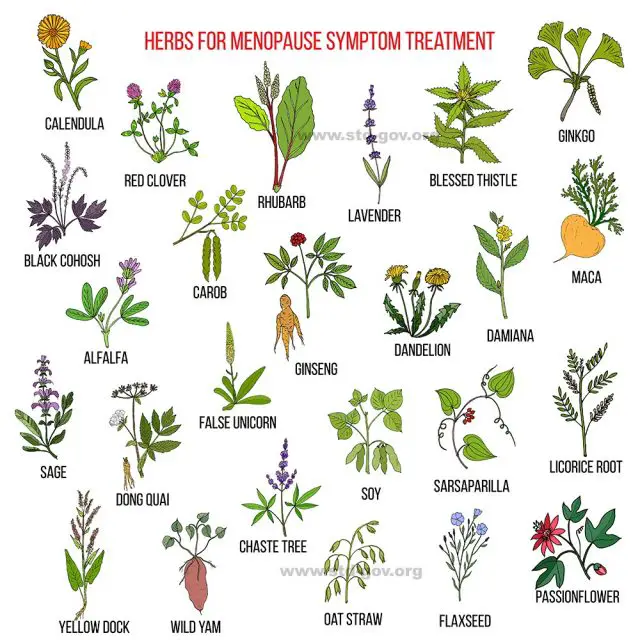How Long Does Menopause Last?
- How long does menopause last?
- How long does the symptoms last?
- Symptoms:
- 1. Irregular vaginal bleeding:
- 2. Hot Flushes:
- 3. Mood swings:
- 4. Weight gain:
- 5. Vaginal itching and dryness:
- 6. Lower fertility:
- 7. Short –term memory lapses:
- 8. Loss of breast size:
- 9. Hair thinning:
- What are the symptoms of a pri-menopausal woman?
- How to determine whether irregular periods are due to menopause or something else?
- How long does menopause last after hysterectomy?
- How long does post menopause last?
- How can one diagnose menopause?
- What are the treatment options of menopause?
- Are there any home remedies for relieving menopausal woes?
Menopause is the phase in which the body does not menstruate for 12 months or more. The ovaries cease to function during this phase and this process occurs generally in aged woman. It is a gradual phase in which every woman faces different symptoms and bodily changes. The premenopausal experience of every woman is different. A woman is no longer fertile once she reaches her menopause.
Generally menopause occurs after the age of 51, but in some cases, it is seen even at the age of 30 years or sometimes after 61 years only. A woman can’t reproduce after she reaches her menopause.
The transition phase starts with changes or delay in the menstrual cycle of a woman. The almond shaped reproductive glands called ovaries are located in the pelvis of a woman. These produce eggs required for reproduction and also produce the estrogen which is the female hormone.
During each menstruation cycle, this egg travels via the fallopian tube into the uterus. The estrogen is responsible for the development of breasts, body shape and body hair in a woman and they also protect the bones. After menopause, adequate estrogen is not produced and a woman may develop osteoporosis.
Perimenopause is the period of 3 to 5 years before the menopause when the levels of estrogen in the body begin to drop.
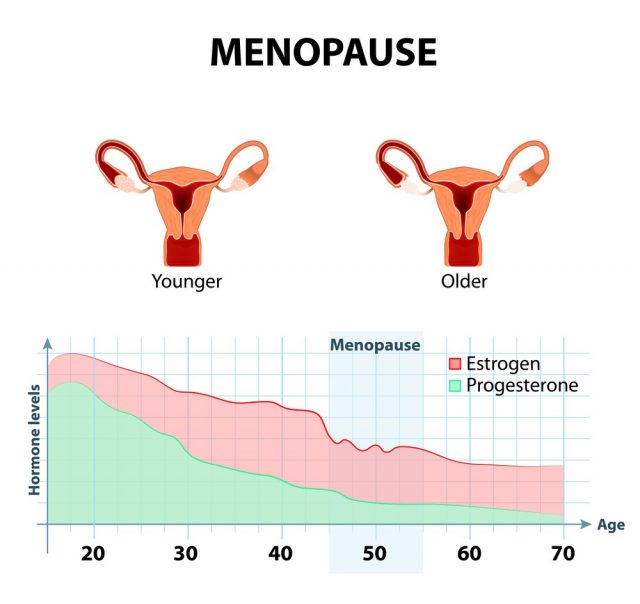
Menopause as a stage in womens lives when their bodies lose the ability to produce enough hormones that keep the body balanced and healthy. Younger and older women uterus
How long does menopause last?
Menopause is the time when a woman’s last period occurs but she will not know at that time about it until she does not menstruate for 12 consecutive months. It is difficult to ascertain how long will a menopause typically last.
How long does the symptoms last?
Every woman faces different symptoms. For some, menopause comes and goes easily while some suffer from a lot of bodily discomfort. The severity and extent of the symptoms differ in every woman.
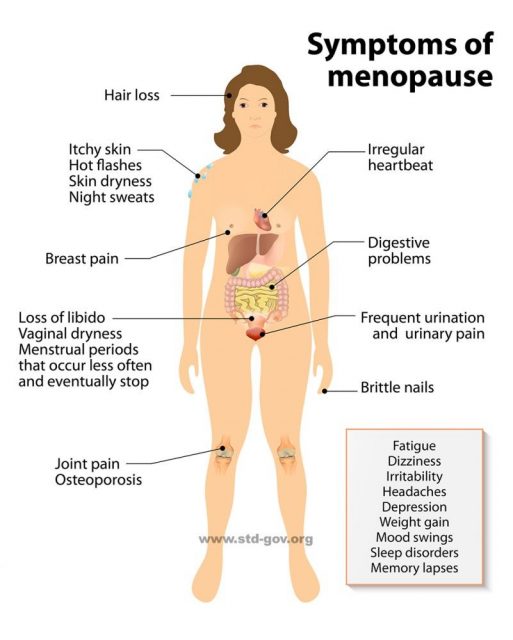
Symptoms:
1. Irregular vaginal bleeding:
This symptom differs in every woman. Some may have excessive and unpredictable bleeding while some don’t face any issues with the abnormal bleeding. This phase follows no regular pattern before stopping permanently. Woman commonly face prolonged gaps between their cycles in the pre-menopausal phase. This phase can continue for years before the final menopause reaches. However, it is a good idea to get a woman evaluated by a doctor to rule out the reasons for irregular periods. Peri-menopausal woman can still become pregnant because though the ovulation has become irregular, it does not stop completely.
2. Hot Flushes:
Sudden warmth spreads all over body followed by head ache or chest ache in a hot flush. Many perspire after a hot flush which usually lasts for several minutes. These are caused due to hormonal changes occurring in the body due to low level of estrogen. Hot flushes at times last for 10 years too. Hot flushes sometimes occur as night sweats which leads to difficulty in sleep patterns and tiredness during the day.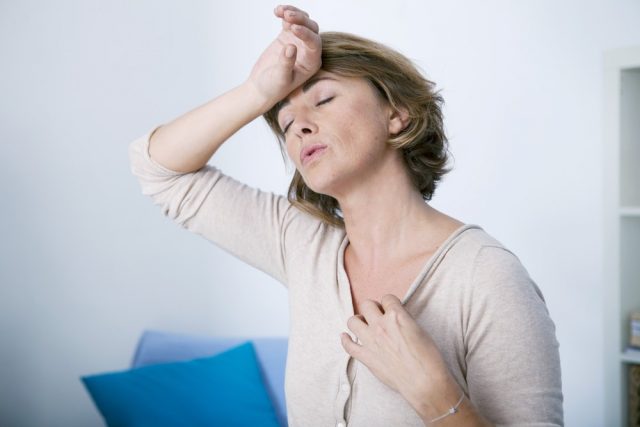
3. Mood swings:
Irritability and rapid mood swings are a common effect of menopause. While the fatigue and tiredness could be due to irregular sleep patterns, some mood swings are often caused due to low levels of estrogen in the body. Till the menopausal fatigue lasts, the mood swings may continue.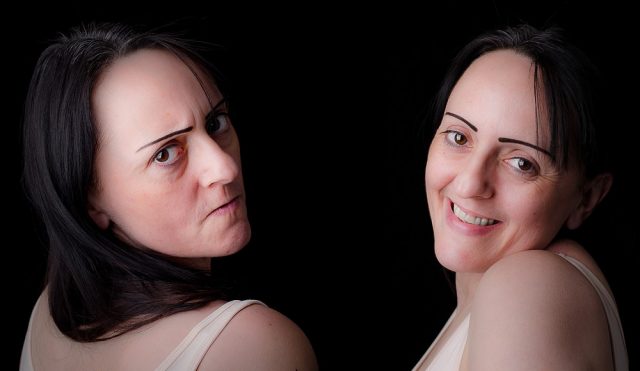
4. Weight gain:
Rapid weight gain also occurs in some menopausal woman. Distribution of fat in the body changes and more fat is accumulated on the abdomen and thigh areas. As the male hormone testosterone is produced by the body, hair growth can be seen on the upper lips and chin areas.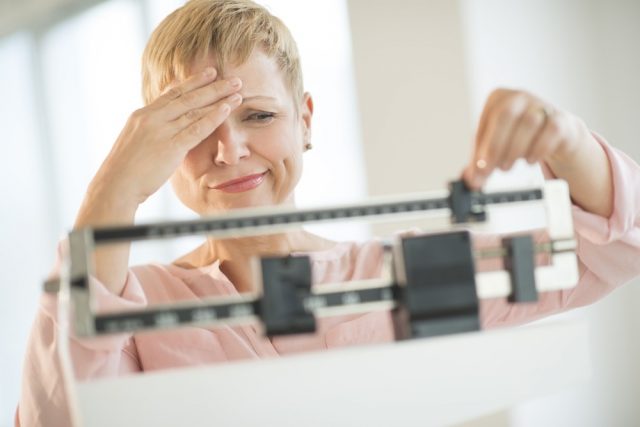
5. Vaginal itching and dryness:
The lining of the vagina becomes thinner and less elastic due to the low estrogen levels leading to dryness and itchiness in the vagina. This also leads to increase in vaginal infections.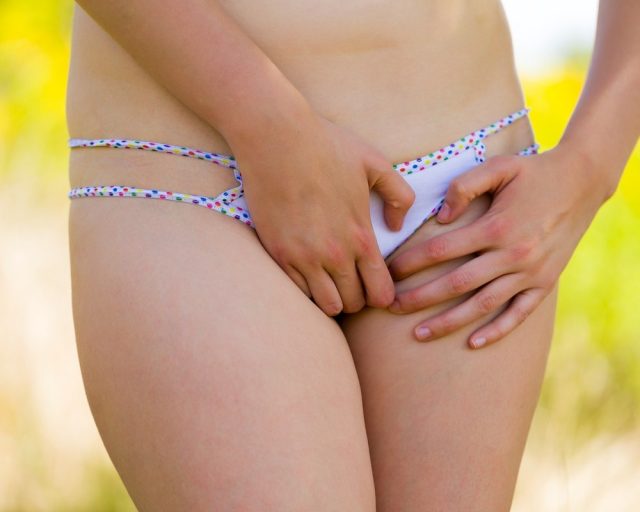
6. Lower fertility:
After the onset of menopause, the ovulation reduces and the woman may find it difficult to become pregnant.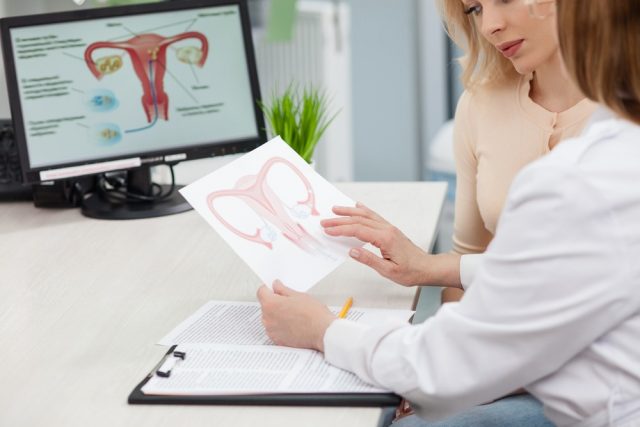
7. Short –term memory lapses:
Some woman may experience reduced concentration levels and difficulty to remember something for longer periods of time.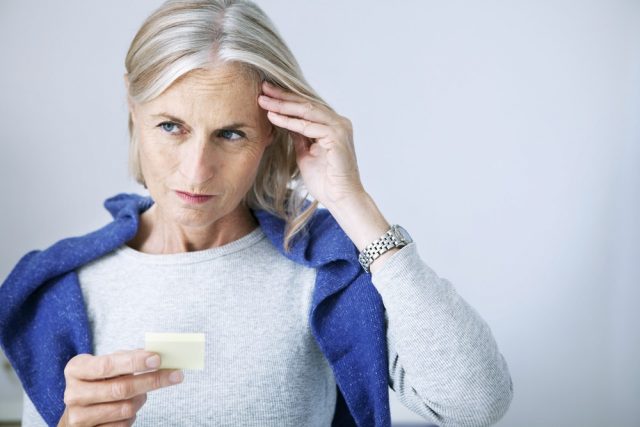
8. Loss of breast size:
the size of the breast depends on the levels of estrogen in the body and as that decreases, some woman may experience loss of breast size.
9. Hair thinning:
Again this is directly linked to estrogen levels in the body.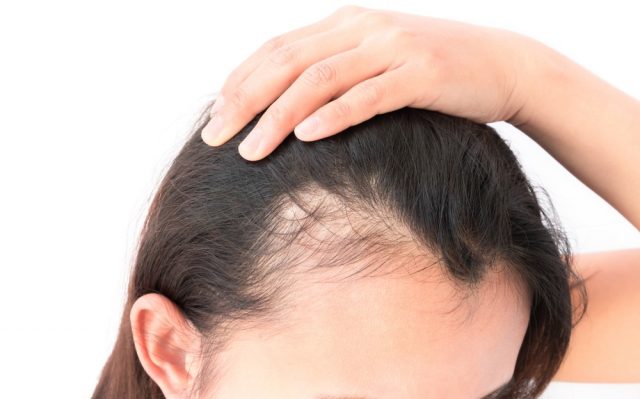
What are the symptoms of a pri-menopausal woman?
- Tenderness in the breast
- Irregular periods
- Heavy flow or lighter flow than usual
- Joint pains
- Racing hearts
- Weight gain
- Loss in libido
- Hair thinning
How to determine whether irregular periods are due to menopause or something else?
If you experience the following symptoms then it is better to consult a doc:
- Longer periods than usual
- Spotting after your period
- Change in your blood flow
- Spotting after intercourse
- Less gap between 2 cycles
These could be due to some medications, stress, fibroids, pregnancy and other factors and not necessarily menopause.
How long does menopause last after hysterectomy?
The surgical removal of the uterus is called hysterectomy and many times, the ovaries are simultaneously removed during hysterectomy. This procedure is called oophorectomy. The surgical removal of ovaries results in immediate menopause in an ovulating woman. This process is called induced menopause and the woman gets no time to go through peri-menopause. Sometimes, oophorectomy is not performed while hysterectomy and the ovaries are capable of normal hormone production.
Such a woman may not be able to reproduce as the uterus is removed but will continue to experience the normal symptoms of menopause when her time comes as the ovaries are functioning normally. But if due to hysterectomy, if the woman faces ovarian failure, then she may not experience menopausal symptoms. Premature menopause occurs at the age of 40 to 45 due to a number of reasons like damage to the ovaries or surgical removal.
How long does post menopause last?
These are the initial years after menopause has set in. Many symptoms like hot flashes start declining. But other conditions like osteoporosis and heart disease are on high risk. Medication, life style changes may reduce the symptoms but it is better to consult a doctor before undergoing any therapy or change.
How can one diagnose menopause?
As hormones fluctuate a lot in a menopausal woman, it is not possible to diagnose menopause on the basis of hormone test. The levels which are low on one day may increase substantially the next day. There is not blood test to diagnose menopause yet. Till date, no test has been developed to diagnose menopause. The only way is to monitor a non-menstruating woman for 12 consecutive months to ascertain her menopausal phase.
What are the treatment options of menopause?
Menopause is not a disease that requires any kind of treatment. However, if the symptoms are severe, they can be treated accordingly.
- Hormone treatment: A hormone replacement therapy or a PHT- postmenopausal hormone therapy can be administered on the woman consisting of progesterone and estrogen. As the levels increase in the body, vaginal dryness, itchiness, hot flushes reduce. But such woman has an increased risk of stroke, heart attack and cancer. This is available in oral pill form, sprays and patch forms. If at all, hormone therapy should be done under a certified practitioner and one should discuss at length the risks and benefits involved in this process.
- Oral contraceptives treatment: This therapy is also prescribed for woman who suffers from irregular vaginal bleeding due to menopause. First the doctor rules out other possible causes of irregular vaginal bleeding. Oral contraceptives regulate the monthly cycle, reduce or relieve hot flushes and also provide contraception.
- Local treatments: Local applications like estrogen cream and tablets can be administered for relief against dryness. Creams, lotions and lubricants also help to relieve the discomfort during intercourse due to vaginal dryness. Sitz bath and Betadine application helps to relieve the dryness.
- Anti-depressants: Some medicines of this genre help in controlling the symptoms of hot flushes. These in some cases have shown to have side effects like decreased sexual libido.
Are there any home remedies for relieving menopausal woes?
- Plant hormones: Isoflavins are plant hormones found in soy and some other plants. These are plant-derived estrogens and their effectiveness is much lower when compared to estrogens. Daidzein and genistein which are the two types of isoflavins are found in soy beans, lentils and chick peas. But these compounds do relieve hot flushes and also help some other symptoms of menopause. These are particularly helpful for women who have risk of cancer. Some woman do consider these are they are natural derivatives and much safer than HT.
- Vitamin E: Though not effectively proven, vitamin E does help in providing relief against hot flushes. Greater dosages are not recommended as they may cause cardiovascular attack.
- Black Cohosh: This herbal preparation has been popular in Europe to relive hot flushes.
- Healthy lifestyle: Regular exercise, nutritional meals and keeping abstain from smoking and alcohol may help relieve a woman from hot flushes and vaginal dryness.
Menopause is a natural phenomenon and every woman goes through it. One should not get scared of it and take it naturally.

